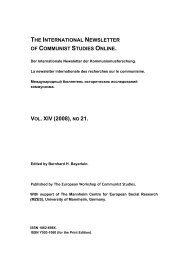11RXNdQ
11RXNdQ
11RXNdQ
You also want an ePaper? Increase the reach of your titles
YUMPU automatically turns print PDFs into web optimized ePapers that Google loves.
Colonialism and Neocolonialism 110<br />
blacks by Western capitalism. Loans and investments are made: the government of the<br />
independent nation is completely dependent on the Europeans and the Americans. This<br />
happened to Cuba in 1900 after a colonial war that it had won. The model still holds<br />
good: it is used every day. The aim is to reserve the same fate for the black continent as<br />
that of Latin America: weakness of central government, alliance of the bourgeoisie (or<br />
remaining feudal landowners) with the Army, a super-government of multi-national<br />
corporations. People are needed for this scam: in the Congo, it would be Kasavubu; his<br />
ambitions and his separatism – even if in the end he accepted a very loose federation –<br />
maintained the old discords sustained by the Belgian administration, and this time<br />
without the whites being suspected of having a hand in it. Ileo and Adoula were able to<br />
second him: their class awareness matched their appetites: protected by the Force<br />
Publique, they could be counted on to finish off the constitution and hasten the<br />
development of the new bourgeoisie. Until now, the évolués had been only salaried<br />
employees, recruited and trained by imperialism and convinced by their masters that their<br />
interests coincided with those of capital: now it was necessary to modify the Congolese<br />
economy, turn some salaried employees into little capitalists, maintain the rural feudal<br />
class, and allow the forces of concentration free rein, even in the countryside. That was<br />
the programme, that was the Congo of 1963; the subject of History between 1960 and<br />
1961, today it is nothing more than the most passive of objects. The fate of Katanga was<br />
settled between Belgians, English, French, Americans, Rhodesians and white South<br />
Africans. The struggles, the uprisings, the war, the brusque and contradictory decisions of<br />
the UN were the effects and the signs of the bargaining which had taken place between<br />
the multi-national corporations, between the governments. If today everything seems to<br />
have been settled, if Katanga is returning to the Congo, it is because the United States has<br />
come to an agree-ment with the Belgians to exploit the Congo’s riches jointly through<br />
mixed companies – against Rhodesia and South Africa and against English and French<br />
designs.<br />
To perfect such delicate compromises, the first thing to be done was to exclude the<br />
Congo from debates and that came down to removing Lumumba. Alone and betrayed, he<br />
remained the abstract symbol of national unity; he was the Congo at the historic moment<br />
of the transfer of powers. Before him there had only been a colony, a jigsaw of dislocated<br />
empires; after him, all that remained was a torn country that would need more than a<br />
decade to achieve its national unity. As prime minister, Lumumba had lost his supports<br />
one after the other and in spite of himself became, by force of circumstances, the agent of<br />
a new separatism which called itself centralization. As a captive and alive, he might<br />
become overnight a principle, a rallying point. He continued to represent a political<br />
approach that he had been prevented from adopting, but which, at the new Government’s<br />
first failures, might appear to be an alternative political solution, one which had not been<br />
allowed to prove itself because it had not been given long enough, and which, if tried,<br />
could possibly turn out to be the only viable one. The mal-contents of the day before had<br />
united against him, those of the day after – doubtless the same – might rally round him. A<br />
prisoner who was once idolized by the crowds continues to be the naked possibility of<br />
praxis; his very existence transforms regrets into hope; because he remains faithful to his<br />
principles, they are much more than a purely theoretical view for new opponents; they are<br />
alive, they are current, humanized by the man who, as people know, is their guardian in




